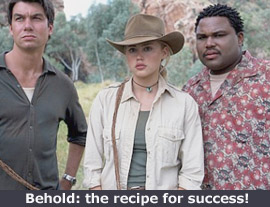ZERO STARS/****
starring Jerry O’Connell, Anthony Anderson, Estella Warren, Christopher Walken
screenplay by Steve Bing & Scott Rosenberg
directed by David McNally
 by Walter Chaw Irresponsible to the extreme, Jerry Bruckheimer’s latest production is sleazy, violent, and packed with the sort of feckless, hateful messages that indicate an almost total disregard for an audience’s intelligence. Kangaroo Jack is, therefore, business as usual for a Bruckheimer production, save for the fact that it’s aimed at a very young audience. The picture is a malignance: it’s bad (for a film about a CGI kangaroo wearing a red “Brooklyn” jacket stealing fifty grand of the mob’s money, that much goes without saying), but what really impresses about the picture is its magnificent inappropriateness.
by Walter Chaw Irresponsible to the extreme, Jerry Bruckheimer’s latest production is sleazy, violent, and packed with the sort of feckless, hateful messages that indicate an almost total disregard for an audience’s intelligence. Kangaroo Jack is, therefore, business as usual for a Bruckheimer production, save for the fact that it’s aimed at a very young audience. The picture is a malignance: it’s bad (for a film about a CGI kangaroo wearing a red “Brooklyn” jacket stealing fifty grand of the mob’s money, that much goes without saying), but what really impresses about the picture is its magnificent inappropriateness.
Hairdresser Charlie’s (dim bulb Jerry O’Connell) stepfather is mob boss Sal Carbonne (Christopher Walken) and, like the father/son mob dynamic of last year’s Knockaround Guys, Sal is disappointed by Charlie’s pacifist demeanour. When Charlie’s idiot best pal Louis (Anthony Anderson)–on parole because he’s a simpleton and a criminal–runs from the police in a stolen vehicle while transporting stolen televisions, the pair find themselves at loggerheads with Sal who, as a last chance sort of deal, sends them Down Under to deliver an envelope of cash. A series of misadventures too banal to describe leads to the titular rodent (marsupial = pouched rodent) hopping off with Louis’s jacket and Sal’s ill-gotten green.
An elderly bush pilot’s admiration for Charlie is kindled when he witnesses our hero shotgunning a pint of beer. Later, that admiration is reciprocated as Charlie exclaims, “I can’t believe how much this guy can drink!” Later still, the elderly bush pilot flies Charlie and Louis around the outback in search of Kangaroo Jack–the joke being, of course, that he’s more than likely drunk. When the pilot is shot with a tranquillizer dart by bumbling sidekick Louis (shades of Cuba Gooding Jr.’s legendary Lightning Jack turn), he instructs that Charlie reach between his legs and pull back hard on the stick. When Charlie first meets comely wildlife conservationist Jessie (Estella Warren), he (and director David McNally) leers at her chest before groping her breasts and exclaiming, “Hey, these feel really real!” Later, Louis berates Charlie for complaining like a woman. Later still, Jessie warns of a potion that will make Charlie’s testicles fall off right before she appears in a wet T-shirt homage to Cocktail in the sleaziest courtship in a children’s film since Simba missionaries Nala in The Lion King.
Kangaroo Jack, in summary, opens with our heroes running from the NYPD in a stolen vehicle laden with stolen televisions; and segues into a series of jokes predicated on misogyny, homophobia, binge drinking, drunken flying, disturbing violence, and voyeuristic leering, all the while indulging in idiotic slapstick vignettes involving our anthropomorphic beastie and a trio of flatulent camels. That Walken (and Martin Csokas and Michael Shannon) turn in mobster performances entertaining and menacing is not only beside the point, but exactly the point. Why there is a genuinely menacing gangster subplot in what advertises itself as a lighthearted family entertainment (overlooking the alcohol abuse, women-bashing, casual indifference to the law, beating of old men, and uncomfortable racial dynamic) is a problem that comments not only on the fact that Kangaroo Jack probably began life as an adult entertainment, but highlights the alien-ness of the kangaroo foolishness in the proceedings.
Whether seen as an adult-themed farce or a children’s film, however, Kangaroo Jack is pap of an unusual vintage. So broad and careless that it never for a moment feels unlike two or three films stitched together, the picture represents a hypothetical nadir for the entire phenomenon of cross-pollinated genres. It’s 8 Heads in a Duffel Bag crossed with Snow Dogs: a formula film that seeks to entice horny teenagers and animal-loving children with the sort of predatory precision generally attributed to child molesters and serial killers. Good for neither adults nor their children, Kangaroo Jack can serve as a cautionary tale or, better, an introduction to serious discussion about how, exactly, our popular culture so often fails to rise above our basest tendencies.


